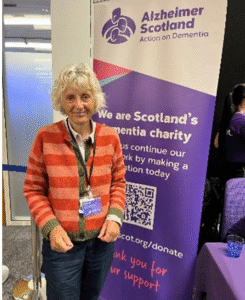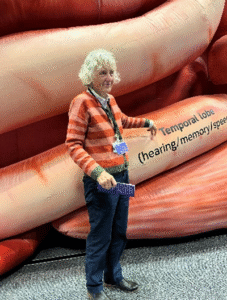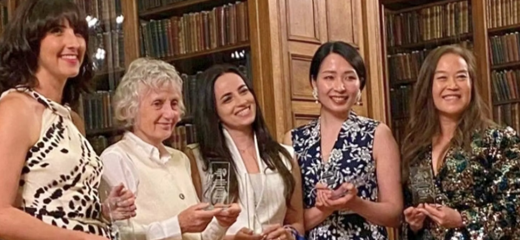Health and Social Care
Women’s Health Champion Autumn 2025 update
November 18, 2025 by Professor Anna Glasier No Comments | Category Women's Health Champion
It is a while since I posted my last blog post.
 School holidays and parliamentary recess over the summer months mean the autumn is already very busy so here is a shortish report to let you know what I have been doing since early May.
School holidays and parliamentary recess over the summer months mean the autumn is already very busy so here is a shortish report to let you know what I have been doing since early May.
Phase Two of the Women’s Health Plan
The Women’s Health Team has spent much of the summer thinking about Phase Two of the Plan. Life in the NHS is challenging, and it would be foolish to present Health Boards with a long list of new actions to consider. Many of the actions in Phase 1 of the Plan were long term, designed to underpin a change in the way we all think about designing and delivering services so that the specific needs of women are not just acknowledged but met. So, the aim in Phase 2 is to build on the actions of Phase 1 but to add a few new areas of work concentrating on issues which seem to ‘fall through the cracks’. The Plan detailing the actions for Phase 2 will be published early in 2026. In September, on behalf of the Team I met with the CMO’s Senior Medical and Public Health Advisory Forum and with the Scottish Association of Medical Directors to present our thinking on Phase 2 taking care to align our proposals with the Service Renewal Framework.
 I am not going to discuss the plans for Phase 2 in any detail in this Blog, you will have to wait until January to read the Plan. However, some of the work that I have been doing over the summer will inform the work of the ‘new’ areas. I think many of you will have heard me say that Phase 1 rather ground to a halt at the menopause although most women live for 25 year or more after their last menstrual period (thankfully). With the needs of older women in mind, the Team and I have met with representatives from Age Scotland and recently attended the Alzheimer’s Scotland Annual Conference 2025, and enjoyed walking through their giant inflatable ‘Babs the Brain’.
I am not going to discuss the plans for Phase 2 in any detail in this Blog, you will have to wait until January to read the Plan. However, some of the work that I have been doing over the summer will inform the work of the ‘new’ areas. I think many of you will have heard me say that Phase 1 rather ground to a halt at the menopause although most women live for 25 year or more after their last menstrual period (thankfully). With the needs of older women in mind, the Team and I have met with representatives from Age Scotland and recently attended the Alzheimer’s Scotland Annual Conference 2025, and enjoyed walking through their giant inflatable ‘Babs the Brain’.
We have set up a pelvic floor health expert reference group to guide us on what we should be doing in this area of work for both urinary and fecal incontinence. I also met experts on bone health who, similarly, are advising us what we should be doing to better inform women about osteoporosis. I have also joined the Scottish Fracture Liaison Service Audit (SFLSA) Steering Group concerned with shortening delays to osteoporosis diagnosis and treatment. Lastly, I am arranging some meetings with researchers working on dementia and estrogen and have joined the CMO’s brain health group to represent the needs of women.
Abortion and Contraception
The final meeting of the Abortion Law Review Expert Group was held in August. The work of the group has been intense with a three-hour long meeting every month for thirteen months and a lot of reading to be done in between. I am extremely grateful to the members of the group for their hard work. I think it is true to say that we all felt honoured to be part of the process. I spent a lot of time with the Abortion Policy Team writing the report and I am grateful for all their help and unfailing good humour as we agonised over the fine details. The Expert Group report was sent to the Minister for Public Health and Women’s Health at the end of August. Publication is anticipated in due course, following which further stakeholder engagement will need to be carried out to make sure that key organisations can provide input on the recommendations.
I met with the Health Board Chief Executives to focus attention on work to increase access to long-acting methods of contraception (intrauterine devices and implants) while at the same time paying attention to the long waits in some Boards for abortion assessment. Additional funding has been made available to primary care for enhanced services (including LARC) but it is up to Boards, and GP practices to decide how to use those funds. Boards have identified individuals who will engage with the Scottish Government on progress regarding access to LARC and abortion care provision.
Eliminating Cervical Cancer
With the Expert Group I have been working on the final report on the Elimination of Cervical Cancer (CC). The incidence of CC has fallen very slightly in the last year from 9 to 8.4/100,000 from 2022-2023. However, vaccine hesitancy and absences from school keep HPV vaccination uptake below the 90% required to eliminate CC, especially in the schools in deprived communities. Uptake of cervical screening also remains well below 90% in these areas. Both need to reach 90% in order to eliminate the disease.
Self-sampling kits were approved for use in the UK during the summer. The cervical screening programme is working towards offering the first self-sampling kits by spring 2026. The initial roll out will focus on reducing inequalities through offering self-sampling to some of the most deprived areas first, as we know cervical screening uptake is lower in these areas.
In early summer I visited Forrester Hill High School in Edinburgh to observe a session at which S1 pupils were taught about HPV vaccination and given the opportunity to ask questions. Shortly afterwards I accompanied the Minister to a school vaccination session at Firrhill High School (also in Edinburgh). I am convinced that we could increase the uptake of HPV vaccine if we had a policy of enhanced self-consent for young people who do not have a signed consent form from their parents on the day of the vaccination team visit. These pupils could be counselled verbally by one of the vaccination team, offered the opportunity to telephone a parent there and then, and/or consent to vaccination for themselves. This is standard practice in some schools but needs to be rolled out across Scotland.
The Expert Group on Elimination of Cervical Cancer plans to submit their final report to the minister in November.
Visits
I accompanied the Minister on her visit to formally open the new gynaecology unit at Queen Margaret Hospital in Dunfermline. The new facility, which is very impressive, is designed to provide specialised gynaecological services, within the context of lengthy waiting times and significant service pressures. I met with clinicians and other staff involved in the provision of the unit’s gynaecology services in Fife. It was abundantly obvious that everyone is extremely proud of the new unit which has allowed them to work in one place and so to function much more efficiently and as a team. I was impressed that Fife team included staff from Estates who had worked hard to ensure that the design of the unit met the clinical needs.
In September I visited the Women’s Health Team in Orkney. It was an extremely productive visit. Orkney bucks the trend across Scotland in that they have no waiting list for gynaecology outpatient referrals or surgery. We spoke about the range of Women’s Health Services and had some thoughtful discussion about women self-referring to services. Whilst women living in Orkney do need to travel to NHS Grampian for more complex procedures which can be inconvenient and very weather dependent I was impressed by the way in which services were designed and delivered locally.
Research
Many of you know that research in Reproductive Health is something about which I feel passionate and so I am delighted to be able to say that The Scottish Government has committed £250,000 to a Women’s Health Research Fund which is being set up in partnership with the charity Wellbeing of Women (who have agreed to contribute an additional £50,000 to the pot). The Fund will focus specifically on menstrual health and gynaecological conditions, menopause, pelvic floor health, healthy ageing and long-term conditions. In 2026, applications will be open to researchers working in Scotland and will be evaluated by the Wellbeing Research Advisory Committee. More information on the Fund and how to apply will be available shortly.
Gynaecology
Although much work has been done in Phase 1 of the Plan in relation to menstrual health, menopause and endometriosis, shockingly long waits for most women in Scotland to be seen in secondary care and, if required, to have gynaecological surgery are hampering progress in these areas. I have continued to work closely with the Minister to draw attention to these long waits. In order to better understand the nuances of the problem we met with gynaecologists from every health board in Scotland and visited Glasgow Royal Infirmary. Gynaecology is now regarded as a priority specialty with respect to waiting times and this year over £10.5 million has been allocated to Health Boards to target long waits for gynaecology. I am determined that collectively we can make headway in addressing very long waits but also re-think the way that gynaecology services are delivered to ensure that women can be seen by the appropriate specialist in a timely manner.
An award
Finally, in the summer I received an email telling me that I had been shortlisted for a Global Women in Healthcare Award from EMMS International (Scotland’s longest-serving international healthcare charity). The email was addressed to Dame Anna. I am not a Dame, so I replied and suggested they had the wrong Anna and that they probably meant to send the email to Dame Anna Dominicsak, Scotland’s Chief Scientist. EMMS apologised for upgrading me to a damehood but insisted that they really did mean me. A couple of weeks later I attended a very enjoyable evening at the College of Physicians of Edinburgh where I was awarded second place in Global Women in Healthcare Awards – Dame Anna was the winner!
(L-R) Dr Chelcie Jewitt, Prof Anna Glasier, Dr Shushan Hovsepyan, Dr Loey Lung-Yi Mak and Dr Shera Chok at the Global Women in Healthcare Awards.

(L-R) Dr Chelcie Jewitt, Prof Anna Glasier, Dr Shushan Hovsepyan, Dr Loey Lung-Yi Mak and Dr Shera Chok at the Global Women in Healthcare Awards
Bone Checker
The Royal Osteoporosis Society launched The Great British Bone Check to mark World Osteoporosis Day on 20 October 2025. I encourage everyone use this free online tool that helps people to assess their bones in a matter of minutes, helping to spot osteoporosis risk factors early.
Although I said at the beginning that the summer had been quieter, from what I have written it seems that I (and the Women’s Health Team) have been doing quite a lot. I should like to take the opportunity before ending this blog to thank Jen who has moved on from the Team to work in Education Scotland. Jen acted as my PA and made sure that I knew what I was supposed to be doing and when and where I was supposed to be doing it, we will miss her.

Leave a comment
You must be logged in to post a comment.